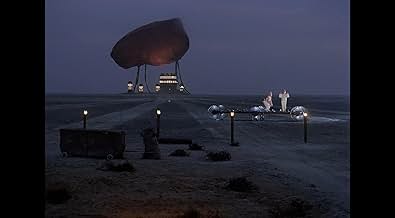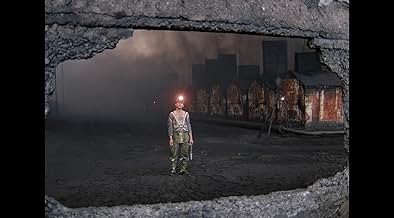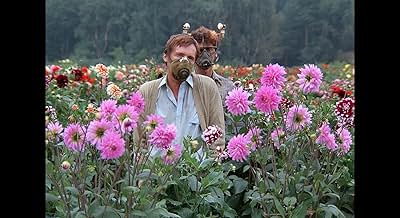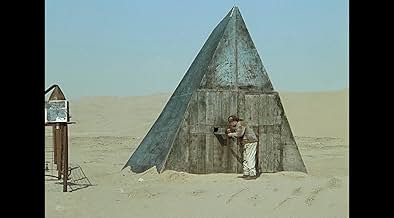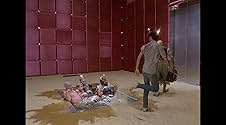CALIFICACIÓN DE IMDb
7.8/10
15 k
TU CALIFICACIÓN
Dos rusos presionan el botón equivocado en un extraño dispositivo y terminan en el planeta telepático Pluke con sus extrañas normas sociales.Dos rusos presionan el botón equivocado en un extraño dispositivo y terminan en el planeta telepático Pluke con sus extrañas normas sociales.Dos rusos presionan el botón equivocado en un extraño dispositivo y terminan en el planeta telepático Pluke con sus extrañas normas sociales.
- Dirección
- Guionistas
- Elenco
- Premios
- 3 premios ganados y 1 nominación en total
Irina Shmelyova
- Tsan - Desert Stage Cart Driver
- (as Irina Shmeleva)
Anatoliy Serenko
- Space Drifter from Uzm
- (as A.Serenko)
Aleksandra Dorokhina
- Huge Woman at Subway Station
- (as A. Dorokhina)
Olesya Ivanova
- Fat Woman Settled under Ferris Wheel
- (as O. Ivanova)
Tatyana Novitskaya
- Presentation Crystal Owner
- (as T. Novitskaya)
Tatyana Perfileva
- Old Woman in Subway Cart
- (as T.Perfilyeva)
Lyudmila Solodenko
- Swarthy Woman Settled under Ferris Wheel
- (as L. Solodenko)
Galina Daneliya-Yurkova
- Lyudmila Mashkova - 'Lucia'
- (as G. Yurkova)
Igor Bogolyubov
- Lord PG's Personal Patsak
- (as I.Bogolyubov)
Valentin Bukin
- Desert-Patrol Ecilopp
- (as V.Bukin)
Yuriy Voronkov
- The Bearded Big Man at Subway Station
- (as Y. Voronkov)
Nikolay Garo
- Lord PG - Pluk Planet Dictator
- (as N.Garo)
- Dirección
- Guionistas
- Todo el elenco y el equipo
- Producción, taquilla y más en IMDbPro
Opiniones destacadas
There isn't much I have to say about "Kin Dza Dza" that hasn't been said by the previous reviewers. But I like this movie so much that I could not resist throwing in my two cents. Yea, it's primitively, or, as someone has pointed out, minimalistically done, so don't expect any special effects. But you know what, who needs them when the movie is that good. The galaxy "Kin Dza Dza" is the slums of the universe, and it shows us our alternate, post-apocalyptic future with a great sense of humor, pantomime and sarcasm. Great cast too. Lyubshin, Leonov and Yakovlev do a fine job here. Since the film's director is Georgian, some Georgian gags were thrown in as well. Oh, and did anyone notice Dyadya Vova's and Gedevan Aleksandrovich's renditions of Frank Sinatra's songs? "Blade Runner," "Brazil," "The Road Warrior," and, to a lesser extent, Luc Besson's "The Final Combat" are all considered to be the classics of the post-apocalyptic, anti-utopian movie worlds. Well, you can add "Kin Dza Dza" to this list.
'Kin Dza Dza' is the kind of film that comes along every once in a blue moon. It's a very simple story of two very ordinary and very different strangers, one Russian, the other Georgian. Whilst going about their normal, every day business they inadvertently become stuck in a rather extra-ordinary situation, with no understanding of where they are or how they got there. The film follows them as they attempt to get home, meeting all manner of strange people with very strange concepts of hierarchy, race, society and culture. A very simple premise.
When I first saw this movie I had no idea what I was letting myself in for. I came across it by pure fluke one day in my university's video library when I was looking for an interesting Cold War era Soviet film to watch. It's easy to see why it is viewed as a cult classic by many Russians and Georgians alike.
The cinematography is surprisingly enticing. It's not particularly inspired, but it somehow just drifts along with the characters. The shots of the desert are bold and striking, whereas the shots inside ships or inside the nomads' homes are dark, cluttered and uninviting. There are stark differences between all the set pieces, and the director is thankfully skilled enough to make the transitions between these vastly different sets seamlessly. The music is very simple and almost casual as it drifts in and out of focus very subtly with the sequences on-screen. The acting is also something to behold. It fits very much in line with the ethos this film seems to carry: simplicity. The characters in this film range from the stoic and reserved, to the verbose and hyperbolically animated. All the actors play their roles very well, adding memorable nuances to their characters, and really helping to convey the peculiarity and absurdity of the situation being portrayed.
The underlying motive of this film appears to be to convey a message of equality. 'Kin Dza Dza' is a film which, through humour and through sheer simplicity, is able to make the viewer realise the absurdity of social and racial discrimination. I whole-heartedly recommend watching it. It's comical, it's whimsical, it's witty and it's poignant. Well worth the time, if you're able to acquire it.
When I first saw this movie I had no idea what I was letting myself in for. I came across it by pure fluke one day in my university's video library when I was looking for an interesting Cold War era Soviet film to watch. It's easy to see why it is viewed as a cult classic by many Russians and Georgians alike.
The cinematography is surprisingly enticing. It's not particularly inspired, but it somehow just drifts along with the characters. The shots of the desert are bold and striking, whereas the shots inside ships or inside the nomads' homes are dark, cluttered and uninviting. There are stark differences between all the set pieces, and the director is thankfully skilled enough to make the transitions between these vastly different sets seamlessly. The music is very simple and almost casual as it drifts in and out of focus very subtly with the sequences on-screen. The acting is also something to behold. It fits very much in line with the ethos this film seems to carry: simplicity. The characters in this film range from the stoic and reserved, to the verbose and hyperbolically animated. All the actors play their roles very well, adding memorable nuances to their characters, and really helping to convey the peculiarity and absurdity of the situation being portrayed.
The underlying motive of this film appears to be to convey a message of equality. 'Kin Dza Dza' is a film which, through humour and through sheer simplicity, is able to make the viewer realise the absurdity of social and racial discrimination. I whole-heartedly recommend watching it. It's comical, it's whimsical, it's witty and it's poignant. Well worth the time, if you're able to acquire it.
I'm really surprised about the commentators referring to "сrappy special effects" in Kin-dza-dza. Are you crazy guys ? Re-watch "Terminator" with all that crappy cheezy stop-motion in bare endosceletone scenes. LEGO brick movies fans shoot the same with a cheap camera. Just think that "сrappy soviet SFX" in Kin-dza-dza uses no stop-motion or scale-down, all Plukan flying tech moves absolutely smoothly and is integrated into the picture completely seamlessly. Compare this to any famous same age sci-fis. Robocop-2 uses stop-motion to animate a scale-down figure of Robocain, and Robocop is a live actor imitating robo-moves inside a costume. And in Kin-dza-dza you see all fantastic Plukan flying tech like real-time real-size (no scale down, no stop-motion) moving objects integrated into the picture seamlessly. So please, just don't confuse the minimalistic design of Plukan starcrafts which is an important part of the scenario with poor rendition of SFX in this movie. Plukan tech is minimalistic dirty rusty crappy looking squeaking - it was deliberately planned so by the movie makers and conveys some ideas.
It is the 1980's, and Vladimir Mashkov is a foreman in Moscow. One day, while walking along Kalinin Prospekt- now New Arbat Avenue- he spots a peculiar barefooted man speaking about space, holding what he claims to be a teleportation device. Gedevan, a young violinist, also notices the man, and- sceptical but intrigued- they engage with the stranger, only to find themselves whisked away through space and time to a planet called Pluke. Will they be able to survive the strange societal norms of this far-away world, and can they ever make it back to earth?
Directed by Georgiy Daneliya, 'Kin-dza-dza!' is a wild science-fiction adventure that is like an interstellar 'Alice In Wonderland'. Written by Daneliya and Revaz Gabriadze, its narrative is both compelling and comedic, though also has thematic depth. As it unfolds, the film evolves from a quirky space adventure into a poignant critique of humanity. Daneliya and Gabriadze's storytelling is a balancing act of satire and sympathy, making the audience laugh while simultaneously provoking thought about deeper issues. They use the society on Pluke to satirise and comment upon the absurdities of our own societal norms and the often arbitrary nature of authority and power.
As Mashkov and Gedevan grapple with the planet's bizarre customs and language, viewers are invited to reflect on the peculiarities of human behaviour and the universal search for belonging and understanding. As they struggle to adapt to a world where the mundane becomes extraordinary and the illogical becomes law, the audience is drawn into a journey that is as much about self-discovery as it is about survival. The film masterfully intertwines the comedic with the critical, using the alien landscape as a mirror to our world. The characters' odyssey becomes a metaphor for the human condition, questioning what it means to be 'civilized' and challenging the viewer's perceptions of normalcy.
Moreover, the stark landscape of Pluke is a canvas upon which Daneliya and Gabriadze paint a scathing critique of discrimination and class difference. The inhabitants of the planet, divided by a rigid class system denoted by the colour of their pants, reflect the often unspoken yet deeply entrenched societal divisions of our own world. Daneliya does not shy away from depicting the absurdity of prejudice based on arbitrary markers, be it the colour of one's trousers or the circumstances of one's birth. Through the lens of science-fiction, the film invites viewers to confront the uncomfortable realities of inequality and the illogical nature of societal hierarchies.
It is also a technical achievement on every level. Aleksandr Samulekin and Teodor Tezhik's production design is a testament to their resourcefulness and creativity. Despite the constraints of a modest budget, they crafted a visual spectacle that rivals the grandeur of more lavishly funded sci-fi epics. The spacecrafts, seemingly cobbled together from spare parts, and the expansive interiors of private compounds, are not just set pieces but characters in their own right.
Furthermore, the environments of Pluke, from its barren landscapes to the intricately detailed interiors, serve as a canvas for the film's exploration of themes, such as resource scarcity and the stark divide between social classes. The clever use of everyday items repurposed into futuristic technology not only adds a layer of authenticity to the world-building but also mirrors the film's commentary on consumerism and waste.
In addition, cinematographer Pavel Lebeshev captures the desolation of Pluke with a palette that is both stark and expressive, complementing the film's tone astutely. His use of lighting and camera angles brings the barren environment to life, fostering a sense of isolation that mirrors the characters' internal struggles. The contrast between the starkness of the planet's surface and the occasional bursts of vibrant colour serves to highlight moments of hope and humanity in an otherwise bleak world.
Moreover, Lebeshev's skilful framing serves to isolate Mashkov and Gedevan within the vastness of the landscape, emphasizing their vulnerability and the daunting task of finding their way home. Yet, it is in these moments of solitude that the characters- and the audience- find a connection to the universal themes of resilience and companionship. In this way, Lebeshev's commendable work complements and aids the narrative perfectly.
Stanislav Lyubshin stars as Mashkov, opposite Levan Gabriadze as Gedevan and Yevgeny Leonov and Yury Yakovlev as two Plukanians who join in their quest. Lyubshin delivers a multifaceted performance that anchors the film's fantastical elements with a sense of everyman realism. His portrayal is a blend of bewilderment and determination, capturing the essence of a man torn from his world, yet striving to understand and overcome the challenges ahead of him.
Gabriadze's Gedevan is the perfect foil to Mashkov's stoicism. Gabriadze infuses his role with a youthful curiosity and an idealistic charm that resonates with the viewer's sense of adventure. His wide-eyed wonder and gradual character growth reflect the film's underlying message about the value of experience and the power of perspective. They share a brilliant chemistry, embodying the confusion and camaraderie that comes with being strangers in a strange land.
Leonov and Yakovlev, meanwhile, excel as the comedic aliens; delivering whimsical and wise performances, bringing both comedy and pathos to the tale. The dynamic between them is nothing short of delightful. Leonov's comedic genius shines through in his character's eccentricities and unexpected depth, while Yakovlev's delivers a masterclass in physical comedy and timing. Together, their characters provide not only levity but also a critical commentary on the nature of communication and misunderstanding.
A fun trip to a strange world, Georgiy Daneliya's 'Kin-dza-dza!' is a brilliant piece of science-fiction, that defies the confines of time and space. It resonates with viewers on multiple levels, featuring thematic depth, as well as bounteous humour. Containing stunning production design and striking cinematography, it is a truly original piece of work. Boasting strong performances from all in the cast that leave an indelible mark on the viewer's memory, 'Kin-dza-dza!' is truly out of this world.
Directed by Georgiy Daneliya, 'Kin-dza-dza!' is a wild science-fiction adventure that is like an interstellar 'Alice In Wonderland'. Written by Daneliya and Revaz Gabriadze, its narrative is both compelling and comedic, though also has thematic depth. As it unfolds, the film evolves from a quirky space adventure into a poignant critique of humanity. Daneliya and Gabriadze's storytelling is a balancing act of satire and sympathy, making the audience laugh while simultaneously provoking thought about deeper issues. They use the society on Pluke to satirise and comment upon the absurdities of our own societal norms and the often arbitrary nature of authority and power.
As Mashkov and Gedevan grapple with the planet's bizarre customs and language, viewers are invited to reflect on the peculiarities of human behaviour and the universal search for belonging and understanding. As they struggle to adapt to a world where the mundane becomes extraordinary and the illogical becomes law, the audience is drawn into a journey that is as much about self-discovery as it is about survival. The film masterfully intertwines the comedic with the critical, using the alien landscape as a mirror to our world. The characters' odyssey becomes a metaphor for the human condition, questioning what it means to be 'civilized' and challenging the viewer's perceptions of normalcy.
Moreover, the stark landscape of Pluke is a canvas upon which Daneliya and Gabriadze paint a scathing critique of discrimination and class difference. The inhabitants of the planet, divided by a rigid class system denoted by the colour of their pants, reflect the often unspoken yet deeply entrenched societal divisions of our own world. Daneliya does not shy away from depicting the absurdity of prejudice based on arbitrary markers, be it the colour of one's trousers or the circumstances of one's birth. Through the lens of science-fiction, the film invites viewers to confront the uncomfortable realities of inequality and the illogical nature of societal hierarchies.
It is also a technical achievement on every level. Aleksandr Samulekin and Teodor Tezhik's production design is a testament to their resourcefulness and creativity. Despite the constraints of a modest budget, they crafted a visual spectacle that rivals the grandeur of more lavishly funded sci-fi epics. The spacecrafts, seemingly cobbled together from spare parts, and the expansive interiors of private compounds, are not just set pieces but characters in their own right.
Furthermore, the environments of Pluke, from its barren landscapes to the intricately detailed interiors, serve as a canvas for the film's exploration of themes, such as resource scarcity and the stark divide between social classes. The clever use of everyday items repurposed into futuristic technology not only adds a layer of authenticity to the world-building but also mirrors the film's commentary on consumerism and waste.
In addition, cinematographer Pavel Lebeshev captures the desolation of Pluke with a palette that is both stark and expressive, complementing the film's tone astutely. His use of lighting and camera angles brings the barren environment to life, fostering a sense of isolation that mirrors the characters' internal struggles. The contrast between the starkness of the planet's surface and the occasional bursts of vibrant colour serves to highlight moments of hope and humanity in an otherwise bleak world.
Moreover, Lebeshev's skilful framing serves to isolate Mashkov and Gedevan within the vastness of the landscape, emphasizing their vulnerability and the daunting task of finding their way home. Yet, it is in these moments of solitude that the characters- and the audience- find a connection to the universal themes of resilience and companionship. In this way, Lebeshev's commendable work complements and aids the narrative perfectly.
Stanislav Lyubshin stars as Mashkov, opposite Levan Gabriadze as Gedevan and Yevgeny Leonov and Yury Yakovlev as two Plukanians who join in their quest. Lyubshin delivers a multifaceted performance that anchors the film's fantastical elements with a sense of everyman realism. His portrayal is a blend of bewilderment and determination, capturing the essence of a man torn from his world, yet striving to understand and overcome the challenges ahead of him.
Gabriadze's Gedevan is the perfect foil to Mashkov's stoicism. Gabriadze infuses his role with a youthful curiosity and an idealistic charm that resonates with the viewer's sense of adventure. His wide-eyed wonder and gradual character growth reflect the film's underlying message about the value of experience and the power of perspective. They share a brilliant chemistry, embodying the confusion and camaraderie that comes with being strangers in a strange land.
Leonov and Yakovlev, meanwhile, excel as the comedic aliens; delivering whimsical and wise performances, bringing both comedy and pathos to the tale. The dynamic between them is nothing short of delightful. Leonov's comedic genius shines through in his character's eccentricities and unexpected depth, while Yakovlev's delivers a masterclass in physical comedy and timing. Together, their characters provide not only levity but also a critical commentary on the nature of communication and misunderstanding.
A fun trip to a strange world, Georgiy Daneliya's 'Kin-dza-dza!' is a brilliant piece of science-fiction, that defies the confines of time and space. It resonates with viewers on multiple levels, featuring thematic depth, as well as bounteous humour. Containing stunning production design and striking cinematography, it is a truly original piece of work. Boasting strong performances from all in the cast that leave an indelible mark on the viewer's memory, 'Kin-dza-dza!' is truly out of this world.
10D-V
Not as dead serious as Blade Runner. Not as neon and air-conditioned as Brazil. It's not Earth, dear. It's planet Pluke. Dusty, rusty, dirty.
Amazing technology. To any point of the Universe - in five seconds flat. Unless someone borrowed one vital part of your engine without asking.
Interesting society. Everyone can read each other's mind. And still be able to lie.
A story of two Earthlings trying to get home from the cruel lying cheating stealing world of the galaxy Kin-Dza-Dza.
Definitely worth watching. Is there a subtitled copy available? I have no idea.
Amazing technology. To any point of the Universe - in five seconds flat. Unless someone borrowed one vital part of your engine without asking.
Interesting society. Everyone can read each other's mind. And still be able to lie.
A story of two Earthlings trying to get home from the cruel lying cheating stealing world of the galaxy Kin-Dza-Dza.
Definitely worth watching. Is there a subtitled copy available? I have no idea.
¿Sabías que…?
- TriviaHalf the dialogue was ad-libbed.
- Citas
Uef: If I have a little KETSE, I have the right to wear yellow pants, and any Patsak should squat twice before me, not once. If a have a lot of KETSE, I have the right to wear crimson pants, so any Patsak should squat twice, any Chatlanin should make "ku", and Etsilopp can't beat me at night...
- ConexionesFeatured in Ravnyaetsya odnomu Gaftu (2010)
- Bandas sonorasStrangers in the Night
(uncredited)
Written by Bert Kaempfert, Charles Singleton and Eddie Snyder
Performed by Levan Gabriadze
Selecciones populares
Inicia sesión para calificar y agrega a la lista de videos para obtener recomendaciones personalizadas
- How long is Kin-dza-dza!?Con tecnología de Alexa
Detalles
- Fecha de lanzamiento
- País de origen
- Idiomas
- También se conoce como
- Кін-дза-дза!
- Locaciones de filmación
- 26 New Arbat Avenue, Moscú, Rusia(Vladimir and Gedevan meet the barefoot man)
- Productora
- Ver más créditos de la compañía en IMDbPro
Taquilla
- Total a nivel mundial
- USD 23,902
Contribuir a esta página
Sugiere una edición o agrega el contenido que falta

Principales brechas de datos
By what name was Kin-dza-dza! (1986) officially released in India in English?
Responda
